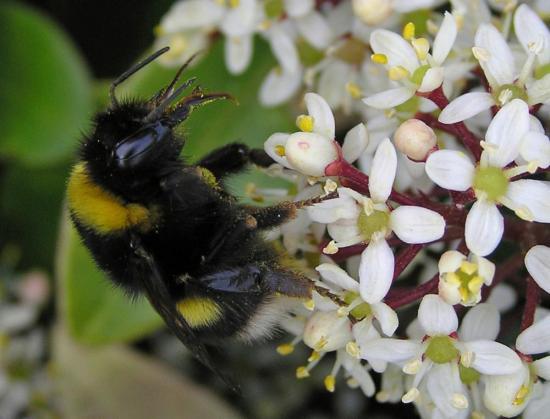Bee research before pesticide ban starts
27th April 2013

Europe should opt to restrict the use of controversial pesticides by 2015 providing a breathing space to allow evidence gathering between now and then to prove or disprove they are harmful to bees.
Scotland’s Rural Affairs Secretary Richard Lochhead has written to the UK Government urging them to accept the restrictions on the use of neonicotinoids but not to implement them until further evidence is gathered. If the research proves the pesticide is not harmful to bees, the proposals should then be withdrawn.
Neonicotinoids account for one per cent of all pesticides used in Scotland and are mainly used to treat oilseed rape crops and some seed potatoes as well as some horticultural crops and winter sown cereals.
The proposed restrictions would only affect certain uses of the pesticides on crops with flowers that are attractive to bees.
France, Germany, Italy and Slovenia have already banned the use of neonicitinoids and a large number of member states are expected to back restrictions at the relevant meeting on Monday in Brussels. In the absence of conclusive scientific evidence, Mr Lochhead said he believed it was right that Europe seeks conclusive evidence before the ban is actually implemented.
Mr Lochhead said:“The Scottish Government takes the health of bees and other insect pollinators very seriously but, in this case, the science has not been clear cut. Ministers have to therefore make careful judgements in the absence of conclusive evidence.
“I recognise that this is a highly sensitive and emotive subject. It is, therefore, disappointing that the results from the bumble bee field trials were inconclusive.
“When it comes to protecting our biodiversity and wildlife, there are times when taking a precautionary approach is perfectly justifiable. It is in the interests of our environment and our farmers that we have healthy bee populations but we know there are a wide range of factors affecting these valuable pollinators.
“However, given the lack of conclusive evidence I think it would be sensible to carry out a further programme of research over the next two years. If the results prove conclusively the pesticide does not harm bees, the proposals would be withdrawn. If not, the proposals would be implemented. A breathing space would allow any existing stocks to be used and also time to ensure that any alternatives on the market do not make matters worse.
“I do not think that year after year of debate over what the science tells us will get us very far or help our bee populations or farmers. That’s why I am suggesting a precautionary approach with a built in breathing space and exit strategy.
“I have therefore written to DEFRA ministers urging them to seek a two-year delay to implementation of the European Commission proposals to restrict the use of neonicotinoid pesticides while further evidence is gathered, and believe this approach offers more clarity than the current approach favoured by them.”
Photo
Bombus cryptarum
Photographer - Gordon Mackie
